
The process of working on EROTICS research closely with the country partners from Nepal, Sri Lanka and Bangladesh was an invitation to reflect on how we can practice the ideas and values of feminist research through our collaboration. Feminist research on the internet and our use of the internet has been growing slowly over the years.
For me, as a user and a disabled feminist working in this space, there were a lot of things I had observed that became a part of the research. My own identity did play a huge role in the project - as we do believe that the person is political. As an Indian feminist, belonging to a dominant caste and religion, I was acutely aware of my privilege in the space. Acknowledging the inherent privilege was important for us as we embarked on the feminist research to ensure that the vocal Indian voice, often termed as a bully in the region, did not over power our collective learnings from the south-Asian region. The research, thus, centred the varied experiences of those living in Sri Lanka, Bangladesh and Nepal.
For me, as a user and a disabled feminist working in this space, there were a lot of things I had observed that became a part of the research. My own identity did play a huge role in the project - as we do believe that the person is political.
From the design of the research to the framing of the questions, the process was participatory. As the regional coordinator, I worked on the broad themes we would cover first, and this document was shared with the local partner-researcher teams as well as the team at APC. Through their collective feedback, the themes were converted to questions and the questions went through an iterative process based on every researchers’ insights and expertise.
Many of the conversations at this phase focused on several aspects of the research. Some of the broad discussions that were particularly insightful were: how we chose to list different gender and sexual identities, their definitions and the multiple choices people could make; the awareness that a “minority” in a country might not be a “minority” in another country; options for self identification for people outside the common terms we hear during the scope of our work; and finally using language which is inclusive of multiple identities and doesn’t exclude anyone.
These conversations were important because each of the partners comes with their own insights, but also laid the ground open for us to work through dominant language and use language more comfortable by the local communities. One such example was the use of the term ‘Hijra’ (a community of trans women) in the Bangladesh survey. In another instance, it was observed in the Sri Lankan research that a lot of the resources were still mostly in English and especially the terms in the global LGBTQ+ activism were not always relevant when translated into Sinhala and Tamil. Through a community engagement process there was an imagining and charting of words, especially in Sinhala and Tamil that were resonated better locally. This act of bringing back agency to the community is an important and essential part of feminist research and knowledge production.
This act of bringing back agency to the community is an important and essential part of feminist research and knowledge production.
Language and meaning making, like Hare Mustin says, is often an exercise in privilege. Because of the ways in which our worlds are built, language has been handed to us mostly by those in positions of power, and often these are men. Therefore, through revisiting words, developing new language and building worlds from our language is an act of defiance but also an act of meaning making in our own way. Through the research process, design and discussions, the Sri Lankan team of researchers were able to build a new repository of language that the community actively chose. This local knowledge production will then feed into our larger global south feminist work as an essential part of disrupting who participates, whose voice is heard while we work on shaping and reshaping our language.
However, the methodology was not always easy to navigate. As a comparative study, it was important to compare countries from the same region with each other. However, one of the observations during the course of this comparative regional study was that the countries themselves are very different. For example, Muslims are a marginalised community in Sri Lanka and Nepal, but they are the majority group in Bangladesh. These small differences mean that when participants of the surveys from these countries answered a question about marginalisation - it meant different things in different contexts. Thus making comparison even between these countries quite hard.
Additionally, in this comparative study, there is not enough sense of whether the people who were surveyed across the countries were of similar economic/social background in the different countries. This directly impacts the comparisons made in this study. It would of course be easier to know the similarities in the groups reached out to - but since many of the participants did answer the survey online, it would be difficult to ascertain exactly the socio-economic group they belonged to.
This local knowledge production will then feed into our larger global south feminist work as an essential part of disrupting who participates, whose voice is heard while we work on shaping and reshaping our language.
Another observation that comes to mind in this scenario is understanding the many different ways in which identity plays a role in marginalisation within the country context. As a disabled woman with significant caste and class privilege, would one simply identify me as marginalised? In practise, my use of the internet is in many ways impacted by the disability, but also by the comforts my privilege affords me. These many nuances of identity and ways in which our internet presence and use is impacted couldn’t be measured, and therefore the cross-country comparisons fall short therein.
These complexities of identity and being in the world were part of the navigation of this feminist research on the internet and an essential part of bringing to the fore the many ways in which our identity influences our positions as researchers or research coordinators, and the steps that need to be taken to build a more diverse pool of resources and understanding of the feminist internet.
- 1873 views






Add new comment